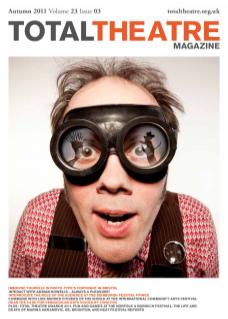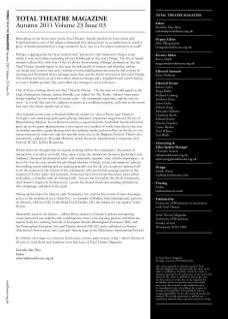Remarking on the shows seen on the Total Theatre Awards shortlist for Innovation and Experimentation, one of the judges commented that sitting down in an auditorium to watch a piece of theatre presented on a stage seemed to be so rare as to be almost innovative in itself!
Perhaps a tipping point has been reached with ‘interactive’ and ‘immersive’ theatre work, which is now everywhere, including all over Edinburgh in this year’s Fringe. The list of Award winners reflects this, with four of the six shows chosen being ‘offstage’ productions. See the Total Theatre Awards report in this issue for full details of winners and shortlist, and see our brand new ‘reviews and news’ website at www.totaltheatrereview.com for full reviews of winning and shortlisted shows amongst more than seventy shows reviewed at this year’s Fringe. The website has been set up with a clear, clean-cut design and a straightforward search facility, so even a ‘luddite peasant’ like your editor can manage to use it with ease…
One of those winning shows was May I Have the Pleasure…? by the man we could regard as the king of interactive theatre, Adrian Howells, our subject for The Works. Adrian’s latest piece brings together his two strands of recent work – the communal experience and the one-on-ones – in a work that casts his audience as guests at a wedding reception, with him as the errant best man who always speaks out of turn…
Also featured in this issue is Hannah Sullivan’s insider-eye view of Proto-type Theater’s Fortnight, a two-week-long quasi-game-playing interactive experience staged across the city of Bristol during Mayfest. In our Reviews section, a report from the Norfolk & Norwich Festival picks up on the game-playing theme with a report on a number of works seen that in one way or another manifest a game-playing-with-the-audience mode; and we reflect on the (by its very nature interactive) street arts and site-specific work seen at the Brighton Festival. There’s also interactivity a-plenty in Alexander Roberts’ article about the International Community Arts Festival (ICAF), held in Rotterdam.
Which raises the thought that for anyone working within ‘the community’, the notion of interactivity is as old as art itself. Once upon a time, the distinctions between ‘performer’ and ‘audience’; between ‘professional artist’ and ‘community member’ were of little importance – at least, this was the case outside the privileged echelons of kings’ courts and emperors’ palaces. Storytelling, music-making and art-making generally was for all, not an activity siphoned off to be the concern of one section of the community, who served their paying masters in the creation of ‘books’ plays’ and ‘portraits’. Some may have been better musicians, more gifted storytellers, or handier with an etching knife – but art was for and by the whole community. And theatre’s origins lie in these roots – and in the shared rituals surrounding celebrations, rites-of-passage, and pleas to the gods.
Taking up the baton for what he calls ‘Vernacular Art’, and for the notion of rites-of-passage as key to the creation of art, is John Fox – co-founder of Welfare State International, and now co-director, with Sue Gill, of the Dead Good Guides. He’s the subject for our regular Voices feature.
Meanwhile, back in the theatre – Adrian Berry, director of North London’s enterprising venue Jacksons Lane explains why contemporary circus is his burning passion; and there are reports from two exciting festivals of European theatre: Birmingham European (BE), and the Nottingham European Arts and Theatre festival (NEAT), and a reflection on Marina Abramovic’s first venture onto a ‘proper’ theatre stage at the Manchester International Festival.
So whether on a stage or a street; in hotel room, country park, beach, or bar – there’s theatre of all sorts to read about and ruminate on in this issue of Total Theatre Magazine.

